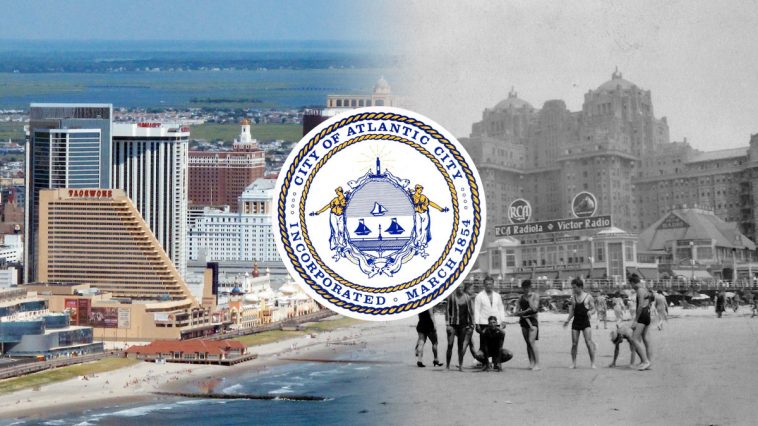Before the 1970s, if anyone were to mention Atlantic City, people would most likely think of two things—the family board game Monopoly and the Atlantic City Boardwalk.
Absecon Island had long been used by the Lenni Lenape Native Americans. An Englishman named Thomas Budd was given title to the island by England but only hunters and Native Americans used the land for more than 70 years.
The Caucasian hunters occasionally built lodges, but the first permanent Caucasian settlers arrived in 1754. Jeremiah Leeds, whose family had hunted on the island for generations, built a farm named Leeds Plantation on what would become Arctic and Arkansas Ave. Leeds’ widow Millicent opened a tavern called Aunt Millie’s Boarding House in 1838, establishing the first non-farm business in the area.
The Leeds family grew over the years and added a few more buildings. Dr. Jonathan Pitney, another Absecon resident, decided to establish a health resort around the Leeds family’s growing community. He teamed with Richard Osborne, a civil engineer from Philadelphia, to bring the Camden-Atlantic City Railroad to the coast. The island was already a stopping point for fishing boats with a small harbor.
Atlantic City Began With a Hotel
Pitney built the island’s first hotel, Belloe House, in 1853. The city was incorporated with the arrival of the railroad in 1854. So, from the start, Atlantic City was defined by travel and tourism.
Hotels evolved from the ancient inn. Although inns have been used by travelers for thousands of years, they were usually very small. Many inns were simply houses that had been converted specifically for travelers. What we think of a modern bed and breakfast today resembles many inns used throughout history.
Modern hotels were imagined to be larger, more uniform, and staffed to serve far more people than inns could accommodate. They were also more likely to be built by wealthy investors and corporations.
Dr. Pitney also championed the opening of a lighthouse in 1854. This came about as a result of many shipwrecks, including one that claimed the lives of over 300 German immigrants.
Tourism Remained the City’s Chief Industry for Generations
The city’s most famous landmark, the Boardwalk, was constructed in 1870 for the most mundane of reasons. Beach sand was creeping into every building and so were the railroad cars. With the opening of two major roads to the mainland that same year, more people arrived in Atlantic City. The sand was a problem for hotels, restaurants, and local residents.
Alexander Boardman was a conductor for the railroad, and he proposed the construction of a wooden walkway along the beachfront to keep the sand under control. The original boardwalk was rebuilt in 1880. The second boardwalk was destroyed by the 1889 hurricane that inundated the city with six feet of water.
The modern boardwalk is an engineering marvel, built to withstand rising seas and protect the town from flooding. It extends for six miles.
The city continued to grow and flourish throughout the late 1800s and early 1900s. The Boardwalk attracted tourists and major entertainers. The population grew to about 100,000 people.
Entertainment attractions were built on the piers extending from the Boardwalk, and the city became known as “America’s Favorite Playground.” The city became so dependent upon tourism that town leaders looked for a way to extend the travel season beyond summer.
The introduced the Miss America Pageant in 1921. Regular pageants weren’t held until the mid-1930s, but Miss America became firmly rooted in the American image of Atlantic City after it moved to the city’s convention hall in 1940.
The Second World War and Aftermath
The city flourished even through the years of the Great Depression thanks to its night clubs. But its fortunes changed once the US entered the Second World War.
Like many older cities on the East Coast, Atlantic City had to get by during the war years with fewer men and resources to maintain the city. Poverty and crime became an issue.
After WWII
In the post-war years, Americans found other ways and places to spend their money. They moved west, built homes around other cities, bought automobiles and traveled farther for fun. They lost interest in the deteriorating cities of the East Coast.
Atlantic City’s economy never had a chance to recover from the war. The city continued to rely on tourism for its main industry even though there were fewer visitors than before the war. Absecon Island and surrounding marshlands were hardly suitable for factories and they would not have appealed to local residents anyway.
City Fathers Look to Gambling for Help
In the mid-1970s, inspired by the growth of investment and business in Las Vegas, Atlantic City pushed for a New Jersey referendum to approve the legalization of gambling. As soon as the law went into effect, the owners of Chalfonte-Haddon Hall Hotel began converting it into the city’s first casino, Resorts International.
After the casino opened in 1978 other casinos were built. The city pinned its hopes on an influx of gamblers and vacationers with money.
Despite the creation of many new jobs, the casino industry failed to revitalize the city itself. Older neighborhoods remained rundown for lack of investment and crime remained a problem.
One of the few successful investments in the city’s new entertainment industry came from Donald Trump’s introduction of major boxing events. Mike Tyson and other athletes help raise public awareness of Atlantic City as a major venue and gambling mecca.
Challenges to Atlantic City’s Gambling Dreams
Despite these successes, Atlantic City struggled to compete with Las Vegas and the growing industry of affordable ocean cruises in other parts of the country. Competition from Native American casinos and legalized gambling in nearby states also made it difficult for Atlantic City to carve out a niche.
Whereas Nevada was the first state to legalize gambling, thus, giving Las Vegas an edge over cities where illegal gambling had flourished, Atlantic City had no low-hanging fruit to harvest. It couldn’t draw off gamblers from other communities the way Las Vegas had.
And the Atlantic coast doesn’t exactly have a tourist-friendly climate similar to Nevada’s drier, wide open spaces.
Other factors that help Las Vegas include its location as a major travel hub in the western United States. Atlantic City is located in South Jersey and is connected to Philadelphia by spur line railroads and highways. It’s a destination rather than a connection point.
Despite these challenges, and the occasional failures of casinos, investors built new properties in Atlantic City throughout the 1980s through mid-2000s. Things might have continued looking up had it not been for the Great Recession of 2008.
The gambling industry was hit hard across the entire country. Major projects in Atlantic City and elsewhere were suspended or deferred until the economy could improve. And more casinos closed down for lack of business.
Conclusion
New Jersey became better known for the scandals plaguing governor Chris Christie than for its gambling. Donald Trump’s casinos went bankrupt and the city’s reputation was harmed by Hurricane Sandy, which in reality, did little damage to the city’s tourist areas.
Although gambling and tourism remain important to Atlantic City today, a new initiative to build a $38 million health park is under consideration. This expansion into a new service-related industry should help the city continue to expand. And it also restores some of Dr. Pitney’s original vision for the city.
Maybe, in the future, Atlantic City will be notable for more than just a board game, a boardwalk, and casinos.
Michael Stevens
Michael Stevens has been researching and writing topics involving the gambling industry for well over a decade now and is considered an expert on all things casino and sports betting. Michael has been writing for GamblingSites.org since early 2016. …





